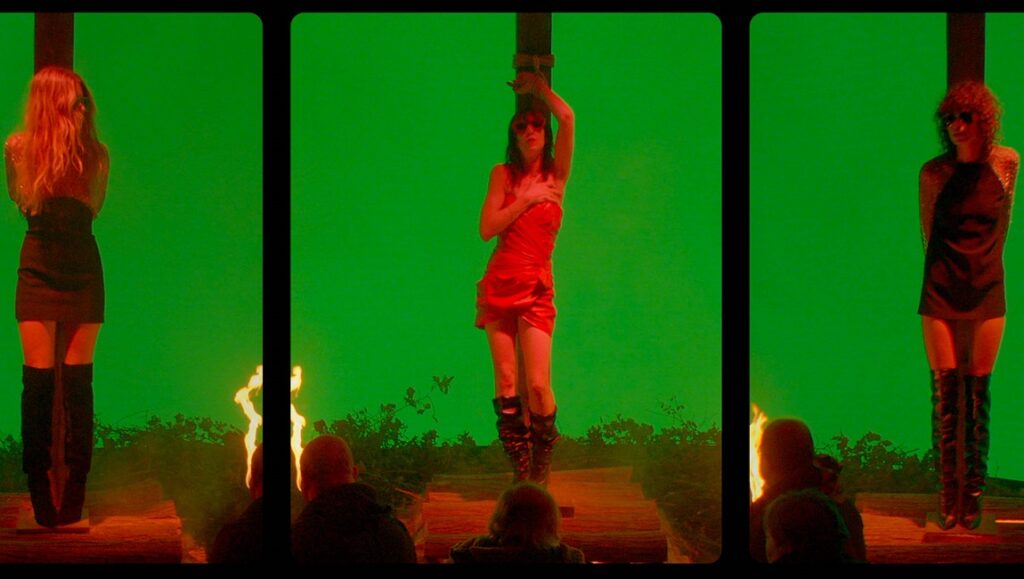After Noé’s career peak with Climax, Lux Æterna represents a disappointing return to the director’s haphazard stylistic tics and overindulgent edgelord sensibilities.
Like fellow provocateurs Lars von Trier, Michael Haneke, and Harmony Korine, Gaspar Noé has cultivated a true “love him or hate him” reputation. A self-professed bad boy, Noé wallows in outlandish violence, depravity, explicit sex, and a grab bag of elaborate (if shallow) formal tricks (as Jonathan Rosenbaum wrote upon Irreversible‘s release, it’s “stupid, vicious, and pretentious, although you might find it worth checking out if you want to experiment with your own nervous system.” Some of these stylistic tics are more palatable than others; much of Noé’s outré sensibility is wrapped up in a patina of entry-level philosophical navel-gazing meant to structure and give weight to his proclivities, like an illusion of intellectual rigor. So imagine this critic’s surprise when Noé’s Climax, despite containing most of the disagreeable elements of the rest of his oeuvre, managed to be thrillingly kinetic and compulsively watchable. Here, finally, was an emphasis on style that allowed the movements of the camera to interact with the rhythms of the human body, a collaboration rather than an imposition, and one so focused on intense choreography that Noé’s deficits in plotting, character, and dialogue mattered less than in prior efforts. As Michael Sicinski has written, “In certain respects he’s the world’s greatest BFA film student, his formal chops outstripping his intellectual mettle to an unfailingly embarrassing degree.” With Climax, at least, these two opposite poles seemed in closer proximity than before.
Unfortunately, the old Noé has returned with Lux Æterna, an interminable 51-minute featurette that began life as a long-form Yves Saint Laurent fashion commercial. Instead, Noé has delivered his own variation on the behind-the-scenes making-of genre, a la Fassbinder’s Beware a Holy Whore or Godard’s Les Mepris (both filmmakers get name dropped and/or quoted here). Noé begins Lux Æterna with a brief essayistic introduction on witchcraft, specifically the burning of witches on crosses, complete with clips from Dreyer’s Day of Wrath and the 1922 film Haxan. The movie then cuts to a split screen (which it will maintain for the rest of its mercifully brief runtime) as French actresses Béatrice Dalle and Charlotte Gainsbourg converse about their experiences acting in bad movies. The two are playing fictionalized versions of themselves; Dalle is directing a film about witchcraft and having a terrible time getting a key shot finished, which Noé spends the better part of the Lux Æterna dramatizing in the most caustic way possible. Gainsbourg is portrayed as flighty and disorganized, while a producer, Yannick (Yannick Bono), plots against Dalle with her cinematographer, Max (Maxime Ruiz). Yannick wants to fire Dalle and put Max in charge of the production, a plan which Max doesn’t seem very keen on. Meanwhile, there’s a journalist wandering around asking for an interview and a young American director prepping his first feature who’s desperate to get Gainsbourg to sign on. There are also all manner of costumers and makeup artists milling about, everyone tense and irritable.
Noé’s mobile camera (operated by longtime collaborator Benoît Debie, who’s also shot films for Korine and Noe’s partner, Lucile Hadžihalilović) careens down hallways, through doorways, and up and down stairs, taking in all of this backstage drama. It gradually becomes clear that Noé isn’t interested in the history of witchcraft as either a locus of feminine power nor as a critique of institutionalized patriarchy, but instead as a kind of iconography of abuse — like von Trier, who Gainsbourg has worked with several times, Noé seems obsessed with visiting violence upon women. Lux Æterna almost becomes interesting once it culminates in a frenzied kind of ecstasy complete with large, flashing LED screens and fake fire, the crew mesmerized by the very seizure-inducing artifice that they’ve constructed. And like most of Noé’s films, there’s a fumbling, grasping attempt at transcendence that suggests some semblance of grace behind the brutish shenanigans. But Noé has nothing but contempt here for the entire filmmaking process, shitting on actors, producers, technicians, film critics, and even the extras. One scene finds Gainsbourg slinking away to an adjoining set to make a phone call; as her young daughter complains that some schoolchildren threatened her with a knife, Noé frames Gainsbourg next to an anatomically correct female corpse shorn of its limbs. It would be almost funny if Noé had ever displayed even a semblance of a sense of humor. Instead, it seems this now 58-year-old man simply can’t help but indulge his childish, edgelord sensibility.


Comments are closed.